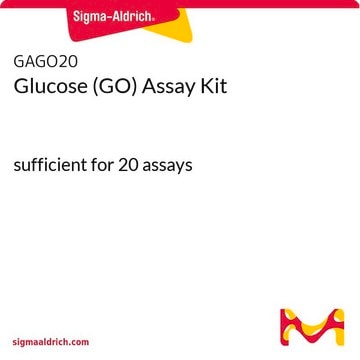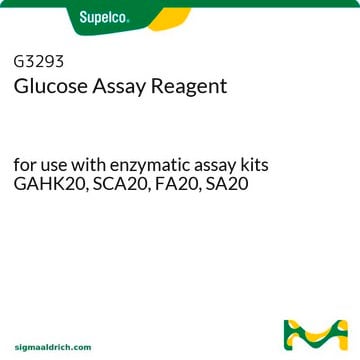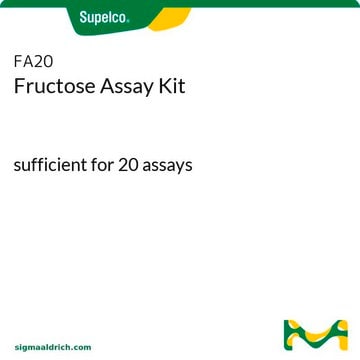GAHK20
Glucose (HK) Assay Kit
sufficient for 20 assays
Synonym(s):
Glucose Quantification Kit
Sign Into View Organizational & Contract Pricing
All Photos(1)
About This Item
UNSPSC Code:
12164500
NACRES:
NA.84
Recommended Products
usage
sufficient for 20 assays
Quality Level
analyte chemical class(es)
sugars (glucose)
technique(s)
photometry: suitable
application(s)
food and beverages
general analytical
storage temp.
2-8°C
Application
This kit is for the quantitative, enzymatic determination of glucose in food and other material. Glucose is phosphorylated by adenosine triphosphate (ATP) in the reaction catalyzed by hexokinase. Glucose-6-phosphate (G6P) is then oxidized to 6-phospho-gluconate in the presence of oxidized nicotinamide adenine dinucleotide (NAD) in a reaction catalyzed by glucose-6-phosphate dehydrogenase (G6PDH). During this oxidation, an equimolar amount of NAD is reduced to NADH. The consequent increase in absorbance at 340 nm is directly proportional to glucose concentration.
Kit Components Only
Product No.
Description
- glucose (HK) assay reagent 20 mL
- glucose standard .5 mL
related product
Storage Class Code
10 - Combustible liquids
Certificates of Analysis (COA)
Search for Certificates of Analysis (COA) by entering the products Lot/Batch Number. Lot and Batch Numbers can be found on a product’s label following the words ‘Lot’ or ‘Batch’.
Already Own This Product?
Find documentation for the products that you have recently purchased in the Document Library.
Customers Also Viewed
Bo-Ruei Chen et al.
Experimental gerontology, 44(8), 493-502 (2009-05-05)
We describe a new chronological lifespan (CLS) assay for the yeast Schizosaccharomyces pombe. Yeast CLS assays monitor the loss of cell viability in a culture over time, and this new assay shows a continuous decline in viability without detectable regrowth
Kuei-Ching Hsiung et al.
Biomedical journal, 43(1), 32-43 (2020-03-24)
CDGSH iron sulfur domain-containing protein 1 (CISD-1) belongs to the CISD protein family that is evolutionary conserved across different species. In mammals, CISD-1 protein has been implicated in diseases such as cancers and diabetes. As a tractable model organism to
Rebecca A Haeusler et al.
Nature communications, 5, 5190-5190 (2014-10-14)
Insulin integrates hepatic glucose and lipid metabolism, directing nutrients to storage as glycogen and triglyceride. In type 2 diabetes, levels of the former are low and the latter are exaggerated, posing a pathophysiologic and therapeutic conundrum. A branching model of
Louis-Philippe Bernier et al.
Nature communications, 11(1), 1559-1559 (2020-03-28)
Microglia are highly motile cells that continuously monitor the brain environment and respond to damage-associated cues. While glucose is the main energy substrate used by neurons in the brain, the nutrients metabolized by microglia to support surveillance of the parenchyma
Michael B Jones et al.
G3 (Bethesda, Md.), 10(12), 4679-4689 (2020-10-29)
Atherosclerosis is a polygenic disorder that often affects multiple arteries. Carotid arteries are common sites for evaluating subclinical atherosclerosis, and aortic root is the standard site for quantifying atherosclerosis in mice. We compared genetic control of atherosclerosis between the two
Our team of scientists has experience in all areas of research including Life Science, Material Science, Chemical Synthesis, Chromatography, Analytical and many others.
Contact Technical Service






